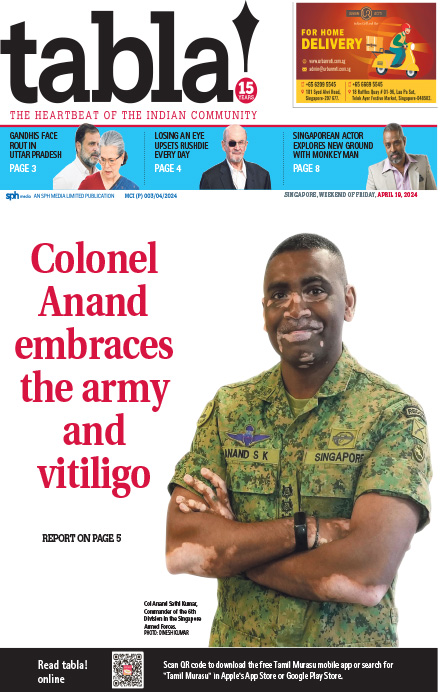V.K. SANTOSH KUMAR
Getting a quote from tabla ustad Zakir Hussain on tabla! was delightful. After enquiring about this weekly, he answered in his inimitable style, like how he played before a packed Esplanade Concert Hall last Sunday.
"The paper types the words out in a rhythm that spells a connection to an instrument called tabla," he said.
"The tabla is not just a drum but a world of wondrous discovery, knowledge, joy and happiness. These elements are completely and affectionately reproduced in this newspaper called tabla!"
The 71-year-old was as evocative when he spoke about his Triveni concert, presented by SIFAS Productions, with Indian virtuosos Kala Ramnath and Jayanthi Kumaresh at the Esplanade.
The leading Indian classical exponents of the tabla, violin and Saraswati veena collaborated to produce music rarely heard. They took sounds to remarkable levels and beyond their traditions.
It was 90 minutes of brilliant musical dialogues between Hindustani (North Indian) and Carnatic (South Indian), seamlessly stitched together by Zakir with his mastery of the tabla.
They picked the melodious raag Charukeshi, which is relatively new in Carnatic music, and wove it into the Hindustani style.
This raag can be rendered without any restrictions in all the three octaves and gave the trio the avenue to render a fluent, joyous and entirely original musical conversation.
Naturally the brilliance of the performers incited feelings of pathos and devotion among the audience. The three represent different traditions of Indian music dating back centuries but when they came together, the meeting of minds was instantaneous.
"Jayanthi with the ancient veena, Kala with her violin, which is essentially a Western instrument, and me with the tabla, in honouring the percussion traditions of India somehow managed to co-exist and look and sound like a family, making a unified statement," said Zakir.
The collaborative process is complex and requires skill, instinct and improvisation. Zakir explained: "I start a particular rhythm that I want to introduce into our journey, so I become the vehicle in a way, and I set the tempo as to how fast the vehicle will go.
"Then Kala and Jayanthi join in as and when they see an opening to get into the vehicle and insert their own ideas into this system.
"There is no imposition and what transpires becomes more like a journey, where we pick one particular mode or melodic scale as our main vehicle. And sometimes we take a side road and stay somewhere for a while. But we always come back to the main theme or storyline."
Of course, Zakir is a master collaborator. He has worked with The Beatles, Van Morrison and The Grateful Dead, among many others. He has scored music for Francis Ford Coppola (Apocalypse Now), Ismail Merchant (The Mystic Masseur) and Bernardo Bertolucci (Little Buddha). His discography cannot be contained on a page.
"I can have a thought, an idea. And it's got to be implemented. What we did was incredible," he said.
"Putting into play what was in my head, I didn't even know it was possible. But the way we came up with the package and music, it was great."
The Hindustani violin is typically played with long notes and the South Indian veena with short notes, so it takes skill to seamlessly stitch its sounds with that of the tabla.
"We had to approach it with a different mindset," said Zakir.
"The three of us are like hikers on a trail to discover a new lake or vista point to see what else is out there. When on a narrow trail, you have to help each other in getting over a pothole, climbing up a boulder or going down a slope. Just imagine us going through all these.
"Unless the three of us worked together, this would not have happened. Something very special can happen only when I drop the 'I'm tabla maestro Zakir Hussain and I will do only what the tabla does' attitude.
"And if it means I have to play like I were playing a bass guitar or a chord on an electric guitar or piano, then that's what I will do to make it work.
"And if this means I have to play my tabla in a very dynamic style, I'm not going to shy away from it."
The trio did not create boundaries by saying that a raag had to be played a certain way. The audience walked away knowing it was an intimate experience they just shared and could not be replicated.
"That's what Triveni is," said Zakir.
"It's the union of how three newborn babies with blank canvases build a world out of their collective imagination and include the audience in the journey."
"So, it's a journey of many different tastes, sceneries and everything else - all interwoven.
For the past 45 years, India-born, United States-based Zakir has worked and interacted with musicians across the genres. He has introduced classical Indian music to audiences all over the world through cross-genre collaborations. He's even got a Grammy among his many awards.
"I've developed a different kind of an approach to the way I present the North Indian percussion repertoire and its tradition. I've become the bridge between contrasting styles of music - as in this case with Jayanthi and Kala," said the tabla ustad.
"The tabla is not just a drum but a world of wondrous discovery, knowledge, joy and happiness. These elements are completely and affectionately reproduced in this newspaper called tabla!"
- Zakir Hussain (above, with Jayanthi Kumaresh (left) and Kala Ramnath)



